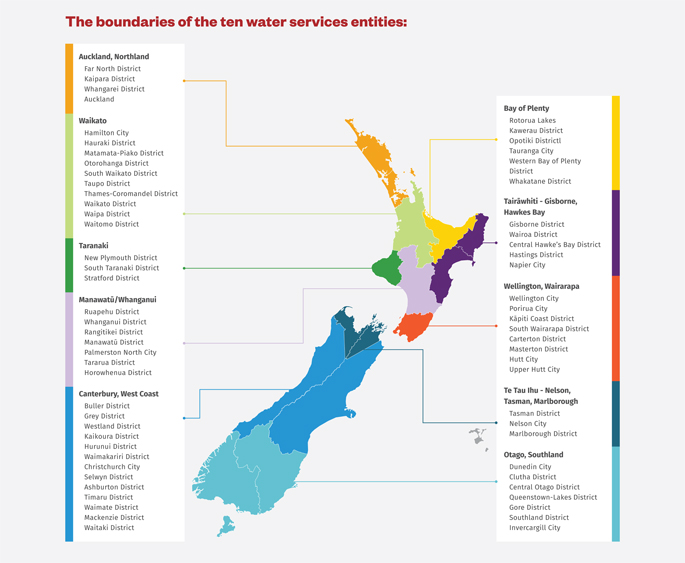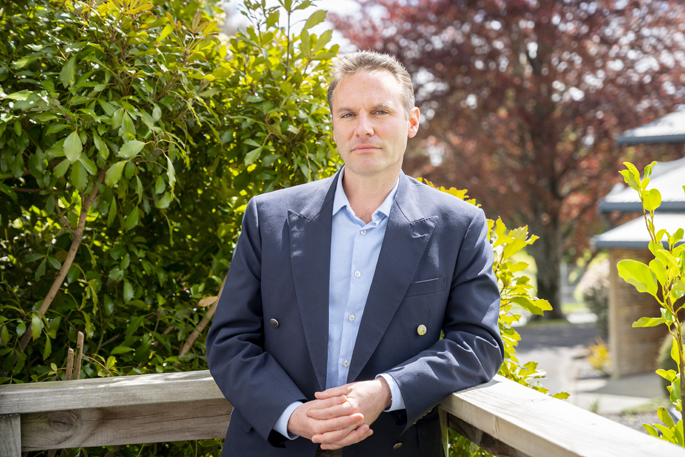Western Bay of Plenty mayor James Denyer welcomes the Government's Three Waters reform changes saying it has 'the potential to create greater acceptance nationwide”.
Prime Minister Chris Hipkins and local government minister Kieran McAnulty announced changes to the reforms this morning, now rebranded as 'Affordable Water Reforms”.
The major changes are that the four entities that would have managed water assets have been increased to 10 and the start date has been pushed out by two years.
The 10 entities will now run along regional boundary lines. The Bay of Plenty will have its own entity comprising of Tauranga City, Western Bay of Plenty, Rotorua Lakes, Kawerau, Ōpōtiki, and Whakatāne.
The government says the change will mean individual councils will have a bigger say over the water service entities while retaining the separation from direct council control, which allows the entities to borrow larger sums.
McAnulty was tasked with relooking at the reform programme after it attracted strong criticism from councils, the public and political opponents.
He says in a statement: 'The feedback has been overwhelmingly clear that our water infrastructure deficit needs to be addressed now if we're to save households from ballooning bills that will make water unaffordable.
'But also that the reform programme must be led at a regional level - we have listened closely and absolutely agree.
'By extending the number of publicly owned water entities to 10, every district council in the country will have a say and representation over their local water services entities through regional representative groups, forming a partnership between council representatives and iwi/Māori that will provide strategic oversight and direction to the entities.”
Denyer says he was pleased the government listened to councils and the community.
'It's clear these changes reflect some criticism of the original proposal and that the mega-entities would not be close enough to the communities they serve.
'Providing every mayor of every local authority with a seat at the table of their respective entity will guarantee the priorities of local communities are heard and make it easier to retain a local workforce.”
 A map showing the regional boundaries for the water service entities under the proposed rework of the legislation. Photo: New Zealand Government.
A map showing the regional boundaries for the water service entities under the proposed rework of the legislation. Photo: New Zealand Government.
The regional representation groups will still be comprised of a 50/50 mix of mana whenua and a representative from each of the local authorities.
These groups will provide strategic oversight and direction but the entities will be run by a professional board with board members elected based on competency and skill.
The reforms aim to help reduce the costs of upgrading water infrastructure across New Zealand.
'These reforms are absolutely essential. Leaving things as they are will mean unaffordable rate bills,” says McAnulty.
'The cost of meeting the upgrades needed for our water systems is projected to be up to $185 billion over the next 30 years.
'Local councils cannot afford this on their own, and households in some areas could see rates rise up to $9,730 per year by 2054 if we do nothing.”
Information provided by the government showed the estimated average cost per household for water services would be $6130 in Tauranga City in 2054 under the current model.
In the Western Bay of Plenty the average cost in 2054 would be $6980 if reform didn't occur.
Under the entity model the average cost for each household in the Bay of Plenty region would be $2780. This equates to saving of $3,350 in Tauranga and $4,200 saving for Western Bay homes.
The new water services entities would start delivering water services from July 1 2026 at the latest with entities able to start before this if they were ready.
Tauranga City Council was approached for comment and a spokesperson responded: 'Tauranga City Council commissioners and staff are taking some time to consider the changes announced and their ramifications in terms of the three waters reform process.”
Public Interest Journalism funded through NZ On Air




6 comments
thinker
Posted on 13-04-2023 17:19 | By Thinker
I cant figure why Maori have to be given 50/50 say when they are entitled to stand and be elected as is the case in Govt. and in fact may end up with stronger representation.
Mr Mayor pull your head in
Posted on 13-04-2023 20:00 | By M@M
You have no mandate for 10 waters nor co governance You will rue the day if you go further with 10 waters
The quick anser
Posted on 14-04-2023 10:13 | By an_alias
Fire this guy.....he is selling you out ! This is a pure power grab and has no benefit
It's lipstick on a pig...
Posted on 14-04-2023 12:13 | By morepork
... but the pig is now 10 pigs, still with co-governance (although it isn't called that any more) and undemocratic appointed administrators. “the potential to create greater acceptance nationwide”... only if you are an easily manipulated, apathetic elector, who doesn't want to think about it. People, it is the same old bullshit, only the names have been changed and now there are 10 of them. Water should not be owned; and local administrations should be funded by government to make sure it gets distributed properly. Never mind, climate change will resolve it when the rain stops and water disappears...
Give me a Break
Posted on 14-04-2023 12:37 | By BJWD
Just because they give it a fancy new name, and make some minor changes.... it's still basically the same, big deal that the mayor can now sit, he's only one voice... makes no difference at all! And co-goverance, what BS, doesn't say co-governance in the treaty. No matter how many times you say it, it doesn't make it a fact!
Another One
Posted on 14-04-2023 13:12 | By Ceem
Oh dear it seems as if we have another WOKE Mayor, then of course we get what we vote for!
Leave a Comment
You must be logged in to make a comment.